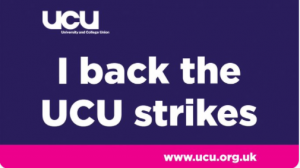
Solidarity with all my colleagues who stood out on picket lines today, and will do so again tomorrow and Friday, and again next year if their demands are not met. 33 universities are striking on pay and pensions; 21 on just pay and 4 on just pensions. University and College Union (UCU) has called the pay dispute ‘The Four Fights’: on pay; anti-casualisation; pay equity (race, gender disability); and workload. Conditions across the sector are dire: over the last decade pay has fallen behind the rate of inflation to the tune of 20%; early career researchers face years on precarious zero hours contracts; institutional pay gaps remain entrenched; and overwork is driving staff to breaking point: depression and work stress are endemic. On a fifth (and separate) charge, changes to the USS pension scheme operating at some institutions are projected to cut pension income by 36%. No teacher wants to disrupt their students’ educations, but many are striking because they literally cannot afford not to.
I’m not on strike, or taking action short of a strike, because my branch did not achieve the 50% turnout for our votes to count. But I understand completely the motivation of those on the streets. After five years on temporary contracts (teaching the same modules each year), I am fortunate to have eventually gained – with the help of UCU and my previous Head – a permanent part-time contract to teach poetry and science fantasy, a job I love. I’ve even been given a recent promotion, to Reader, which I appreciate as a sign of respect from the university. But while fractional posts (as part time posts are called in HE), have advantages for some people, they are extremely difficult to increase – even if extra teaching comes up, universities have no incentive to increase fractional contracts when they can just hire people on zero hours contracts to plug any gaps. At the age of 54 I still don’t earn enough to live on from teaching, and while I love editing as well, it too is precarious work (and well underpaid!). Even if I’d just been paid in line with inflation over the last decade, I could just about scrape by some months; I wouldn’t have to constantly scramble for freelance work and would be under far less stress. I might even have time to write the next novel that might just earn me some money! In regard to the pension strike, I’m on Teachers Pension Scheme, not USS, but I’ve only been paying in for 12 years, most of those on very small contracts – mine was 0.25 before it was 0.5 – and my pension won’t be sending me on any cruises, I can assure you.
I recognise that I’ve enjoyed an itinerant career path, including teaching English in South Korea and Tarot reading for 10 years, so you could say this situation is partly my own doing. Yes, to an extent – I did choose to write poetry, not study accountancy! But I also realise now that my undiagnosed autism made it next to impossible for me to consider any conventional career in my youth. Black-and-white morality is one of the traits of autism that I strongly recognise in myself. As a young person I rejected all patriarchal institutions and capitalist endeavours and resented most authority figures. I had to earn money somehow, of course, but between odd jobs in bookshops, living on benefits, a (very small) inheritance, the occasional arts grant and my high wages in Seoul, I worked as little as possible and travelled as much as I could. (I sometimes joke I took early retirement, in my twenties, and now have to pay for it … ) Watching Atypical, the Netflix program about an autistic young American and his family, I can’t help but wonder how very different things could have been if I’d had support and understanding as an autistic child and teenager, and had learned earlier on to accept the need to earn and save money while channelling my political anger into activism. But no one knew I was autistic, or even very much about the condition, and here I am, having been helped by many people in various ways over the years to develop my own resources. My moral vision having expanded over the years to include one or two shades of grey, I returned to academia in my late thirties in order to share my passion for literature in a job that would offer me some financial security – only to learn that while teaching in a university used to be a solid career path to a mortgage and long European holidays, it very much isn’t that any more!
Even if I was a full time Professor, though, bombing around Sussex in a Citroen with a Russian wolfhound wearing aviator goggles (the Borzoi, not me) . . . I would still believe that strikes aren’t about us as individuals. They are about improving conditions for all. Universities claim not be able to afford UCU’s demands, but 73% of students support the strikes because they recognise that universities should be investing in their teaching staff, not in refurbishments, fancy new buildings or grossly inflated senior management salaries and consultancy fees. Striking lecturers are also motivated by a profound need to protect the ideals of a liberal (as opposed to neoliberal) arts education – how will creativity and critical thinking flourish in Britain with so many Humanities subjects under threat? At Goldsmiths College, where I did my MA, 20 lecturers across History, English & Creative Writing, and 32 professional support staff, are facing the axe. Goldsmiths staff are currently on strike for three weeks, demanding that the university open its books and explore other options to addressing its deficit, including fundraising, applying for govt grants and not paying overpriced consultants. While we are not on strike at Chichester, I am with the strikers in spirit – and will join them on the streets in Brighton tomorrow!

